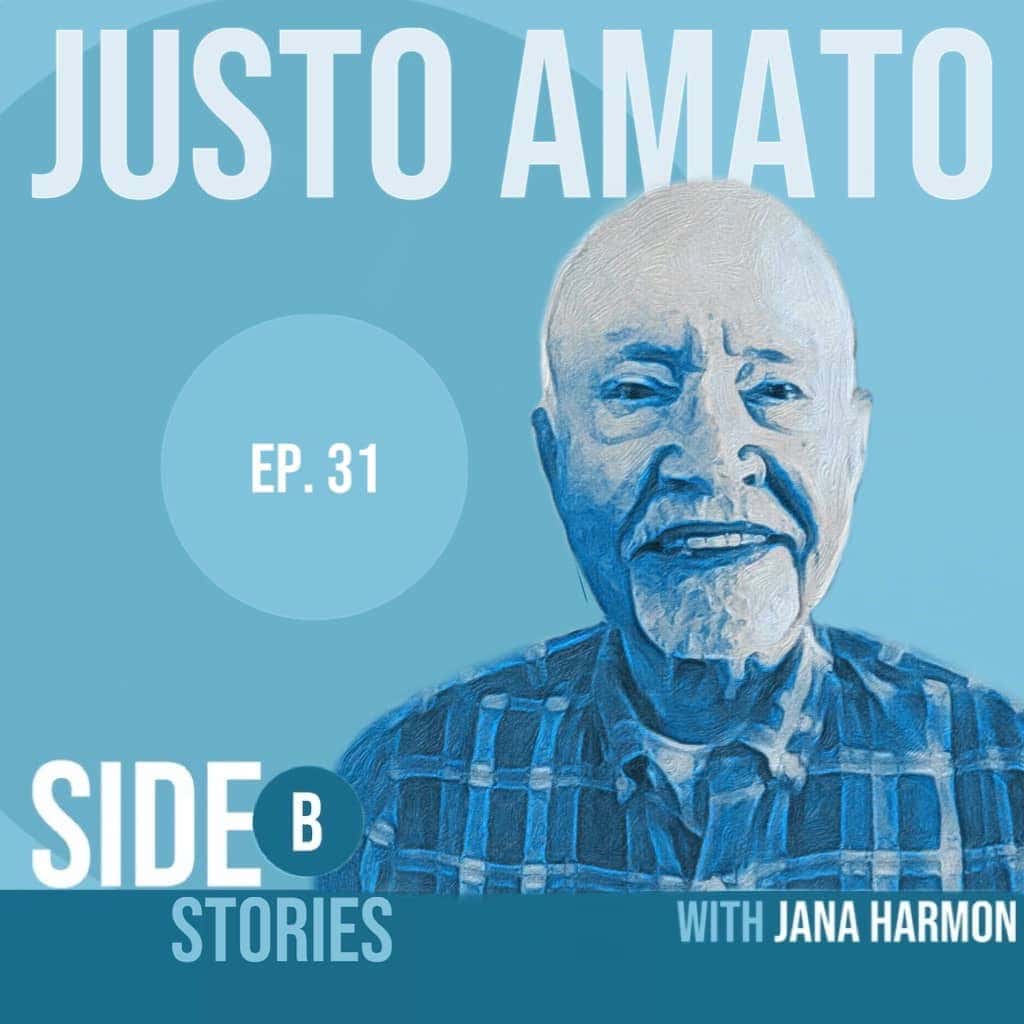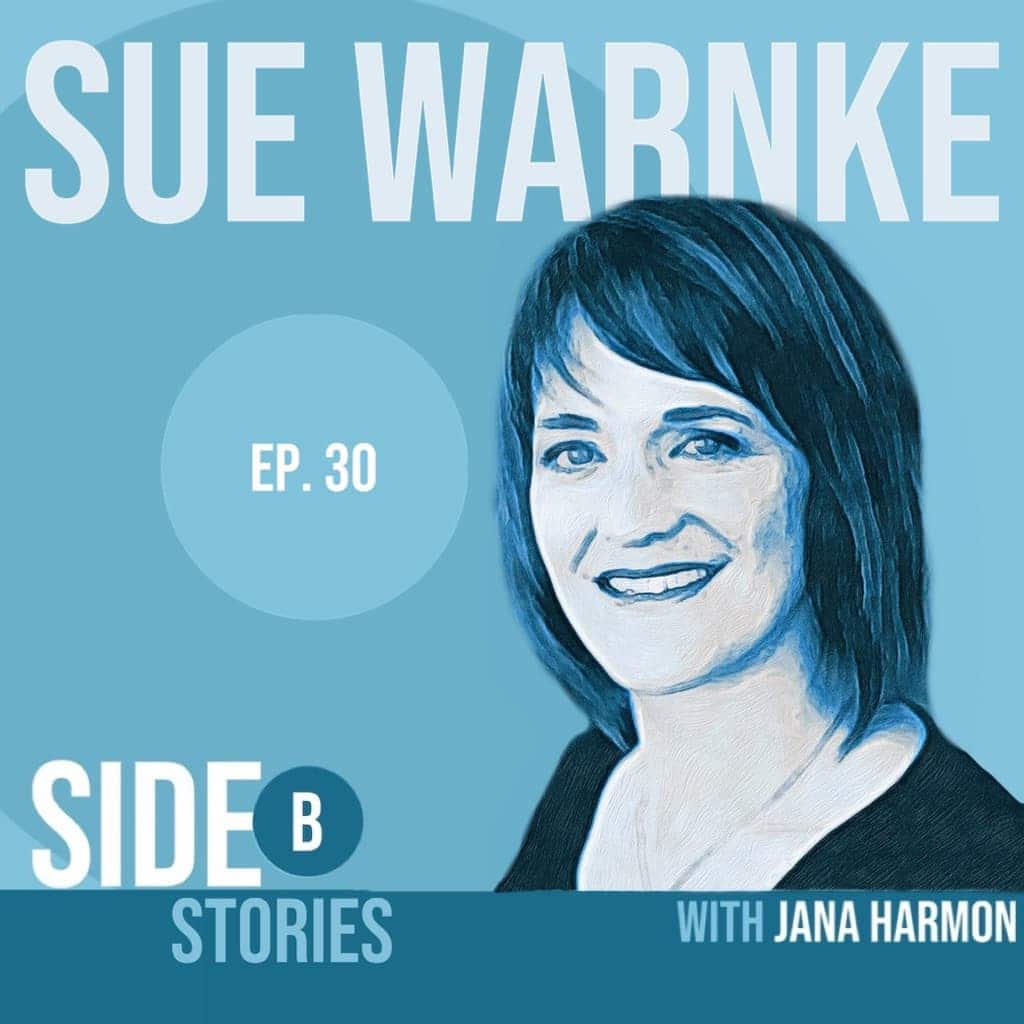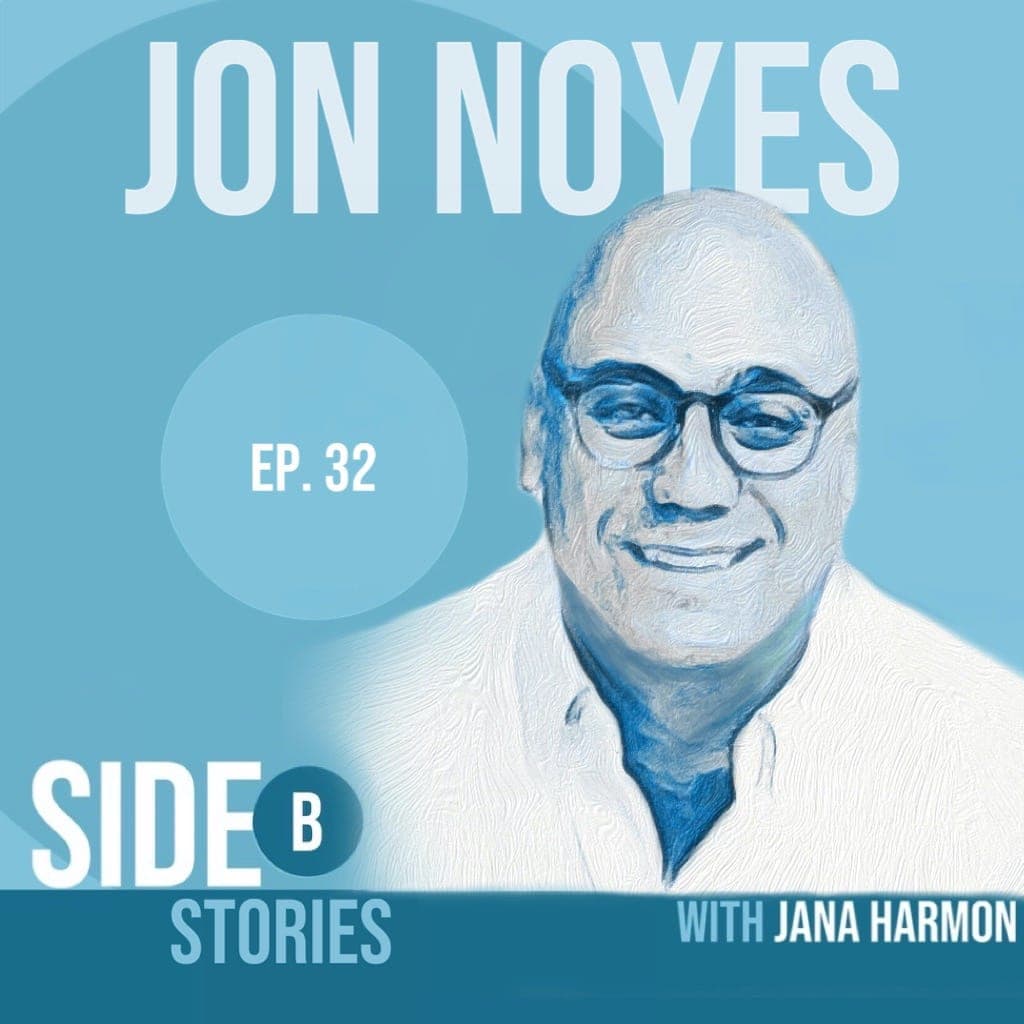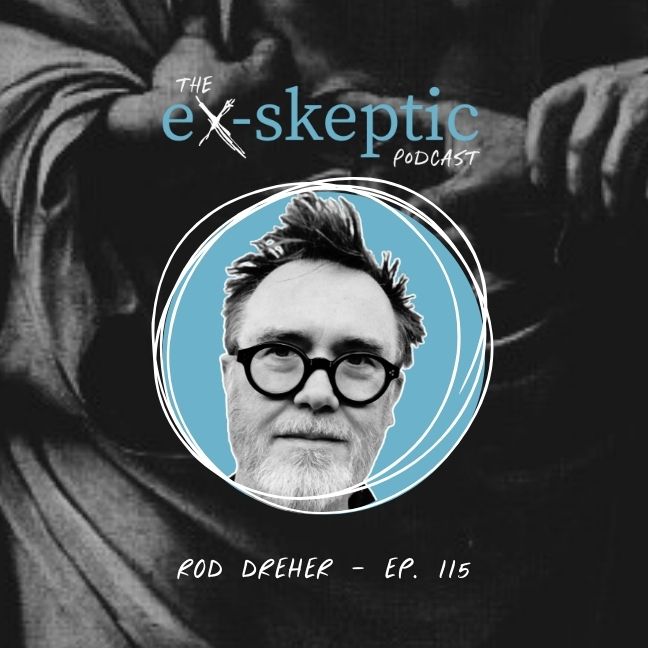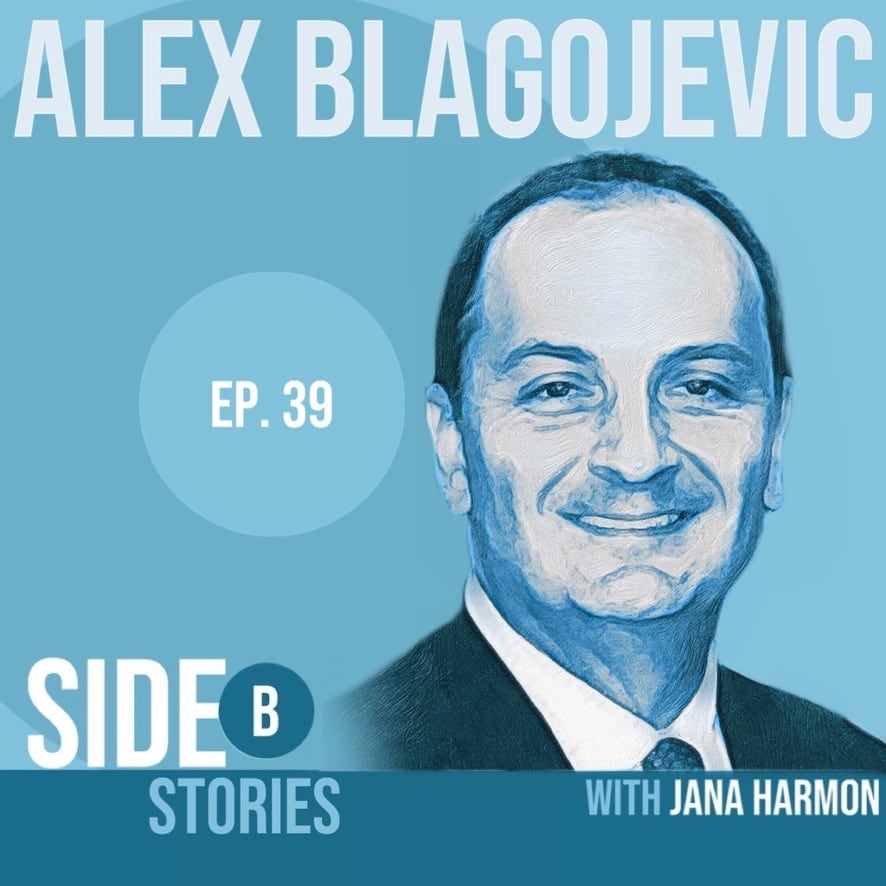Show Notes
Like his father, Justo Amato was a resolved atheist well into middle age yet he unexpectedly came to believe in God.
Hello, and thanks for joining in. I’m Jana Harmon, and you’re listening to the Side B Podcast, where we see how someone flips the record of their life. Each podcast, we listen to someone who has once been an atheist but who unexpectedly became a Christian. It’s often thought that religious people are religious just because they grew up that way. They don’t know any different, so they just believe, and it is thought that, once they discover the truth about religion, they will no longer believe.But what happens when someone grows up in an atheist household, resolutely identifies as an atheist until middle age, and then comes to believe that religion, particularly Christianity, is true?
When someone has been an atheist for most of their lives, later into middle age, the odds of such a dramatic life shift from nonbelief to belief is often surprising, both to the person who’s making such a tremendous paradigm shift, as well as those around them. Those who are resolute in their own worldview often don’t seem to change, but sometimes they do, and we are generally curious as to how that happens.
Today, we’ll be listening to Justo Amato’s long journey from atheism to Christianity. Following in the footsteps of his own atheistic father, it wasn’t until his late 50s that Justo reconsidered his own beliefs. I hope that you join in to hear his story, not only to understand why he was an atheist for so long, but what changed to allow him to reconsider what he once thought impossible to believe. This should be interesting.
Welcome to the Side B Podcast, Justo, it’s so great to have you.
Thank you, Jana. It’s great to be here.
Wonderful, wonderful! As we’re getting started, Justo, why don’t you give us an idea of a little bit about who you are?
Okay. First thing, I was a little 4-month-old immigrant from Spain, so as a little boy, I don’t think I spoke any English until I went to kindergarten. Neither of my parents spoke English. My father spoke a little bit. My mother spoke none. And so my brother and I grew up speaking Spanish and English back and forth, always speaking English to one another but Spanish to my parents, and-
Your family. That’s fascinating. Your family moved over from Spain, so you were immigrants to the US. What part of the US did you grow up in?
Well, we settled in Bound Brook, New Jersey, and that’s where I lived up until I was 44.
Okay, so you grew up in the Northeast.
I did.
Yes. So what was that like, growing up in the Northeast in terms of both your family and your community? Was there a sense of religiosity? Was there a community of faith? Catholicism, I believe, is probably fairly strong in the Northeast. What was your world like growing up? Was there God in it?
No. My father was an atheist. As a young man in Spain, he saw the priests living very well while the community was struggling, and so he just became totally anti-church. So I never heard even the mention of God or Jesus, never saw a Bible. Most of my friends in my neighborhood were Catholic. One of my good friends was an altar boy. Why he was an altar boy, I’ll never figure out, because he was the wildest kid. But anyway, nobody that I knew really went to church on a regular basis. They went Christmas, New Year’s, for communion, but there were really no strong religious people in the neighborhood at all, and so I had no religious training, background, nothing, and it was that way until I was 28 years old. And then I went to the beach, and I met Annabel.
During that period of time, those 28 years, that’s a long time to really consider who you are and your beliefs and what you believe and what you don’t believe. I guess you considered yourself an atheist during that time? And if so, what did you think of Christians and Christianity and belief in God. What was that to you? Was that just something people did on Christmas, Easter, but there wasn’t much more to it than that? How did you consider or what did you think of religion and religious beliefs during that time?
To be honest with you, I didn’t give it much thought because my friends, they never brought up religion at all. I mean I had friends, six or seven friends. Nobody ever talked about religion. So I never even gave it much thought, Jana. And now I meet this young lady. She was 20. I was 28. And it turns out she teaches Sunday school, and she was at the beach with her friend, who was also a Sunday school teacher, so for the first time, I’m hearing about God and Jesus. I went to church with Annabel a few times before we got married, and I didn’t have a problem with going to church, but I didn’t really give myself to anything. I just went and was an observer.
So you weren’t antagonistic towards religious faith.
No.
I was never antagonistic because when I asked Annabel to marry me, and she told me, “I’m going to bring up our children, if we’re lucky enough to have any, I’m going to bring them up as Christians.” I had no problem with that. But on the other hand — I had no problem with it, but I wasn’t ready to accept Jesus, either.
Right. So you, as a good husband and father, went through the motions of church going in order to do something with your family, I guess? Is that correct?
Right. Yeah. Initially, I wouldn’t go. Annabel would take the children, and then Christopher, when he was five years old, said to me, “Dad, how come you don’t go to church with us?” And I didn’t have a good answer, so I said, “Well, okay, fine. I’ll start going with you.” And I started to go with her. And that’s when I met the associate minister at this church that we were going to, and he was such a fine man.
So I’m curious. As someone who had never gone to church, all of your life had really very little exposure to it, what were your first thoughts when you went to church? Not knowing exactly what that was.
Well, the first thing that impacted me was this associate minister. He was such a fine man, and I thought to myself, “Wow! This is what a Christian is like, being like this man?” I was impressed. I thought the world of him. But I still wasn’t ready to accept Jesus.
What was it about his lived Christian life that was impressive to you?
Well, he was so kind and so gentle, and he would give Annabel such fine advice about — like she would say, “If you were confronted with a bull, would you wave a red flag in front of a bull? So when you’re dealing with your son, don’t antagonize him. Just be calm.” Anyway, he was very, very helpful to Annabel.
So it sounds like he gave wise counsel.
He did.
Yeah. So as you were sitting there in those church services, and they were singing songs about God and Jesus or teachings from the Bible, what did you think about all that? In terms of did you think there was any truth to it at all? Or did you think that the Bible was just stories, and they were singing to a nonexistent God? I mean, as an atheist, how would you consider those things?
Honestly, I didn’t give it a whole lot of thought. I just thought, “This is what Annabel wants to do. The kids are benefiting from this, so I’m on board.” But I didn’t see it applying to me, if that makes any sense.
Yeah, yeah. So you didn’t see it applying to you because, as an atheist, there’s a sense of autonomy and independence and that you don’t need that kind of thing in your life. Is that how you were considering it?
Yes.
So in your mind, were Christians someone who were a bit more needy, I guess you could say, or weak, or needed that crutch, or something like that? But it just wasn’t for you?
That’s about right. That’s about right.
But you went through the motions of going to church. How long did you participate with this view? I guess you started going-
I did. For about 13 years. We lived in New Jersey for the first 13 years we were married, and then I lost my job, and I was looking for a job, and it turned out that the job was in Florida, so, in 1978, I started the job in April of ’78. And Annabel and the kids stayed in New Jersey until August. We were having a house built, and the kids were finishing school.
So you moved down to Florida, and you moved the family down to Florida, and I’m curious, too, all this time that you are participating or going through the motions of church for the sake of your family, was Annabel — I’m just thinking for the sake of those who are married to people who don’t believe in the same way. Did she ever talk with you about, “Why don’t you believe?” or put pressure on you, or was she just fairly quiet and just appreciative of you coming? How did that work out?
She never put any pressure on me at all. I guess she felt that, in time — in fact, the associate minister had told her, “Don’t push him. He’ll come around to it when he’s ready. You’re not going to help anything by putting pressure on him,” and so she took his advice.
And I’m sure you appreciated that.
I did.
Yeah, yeah.
So now we’re in Florida, and we had a couple across the street that was attending a non-denominational church that they were very pleased with, and they invited us to go with them. And we did. And so now we started going to this church, and again, I was going every Sunday. I was going to different events. But I was just going through the motions.
Right.
I wasn’t really prepared to accept Jesus. I didn’t see a need for it. And then they had home fellowship groups, and this very good friend of ours, the wife, kept putting a little pressure on me. “Why don’t you come to these meetings? Come! You’re going to love it!” And so I did. I started going to those. Now, I started meeting men that I had a lot of respect for, and I started thinking, “Gee. These guys, they believe. What’s wrong with me? Why can’t I get over this resistance that I have that goes all the way back to when I was a child and never heard of Jesus, never heard of God, never read a Bible, never saw a Bible?” And so now I began studying in the Bible a little bit, and that went on for a few years, and then one day—we would go to church regularly.
It was a Good Friday, and Elizabeth happened to be here. She was in grad school, but she was here, and so Annabel, Elizabeth, and I went to church on a Good Friday, and we met another couple that we were friends with, and they had communion. And I had never taken communion because I felt, “I’m not a Christian. I’m not a believer. I should not take communion,” but all of a sudden I just felt an urge. “I should take communion,” and I did. And Annabel almost fainted. Elizabeth put her hand on our friend who was sitting next to her, and she said, “I can’t believe what I just saw my dad do! I can’t believe it!”
Yes. Well, yeah. I’m sure it was a bit surprising.
That was the moment that I accepted Jesus. And I still can’t explain why then, why that particular night, but that’s when it happened, and then I began to really become a Christian, to participate in home Bible studies and to work in the children’s ministry and to do things, so that was the evening that I accepted Jesus. And I think it was 1992, I think it was. Let’s see. Yeah, I think it was about 1992. So it took me a long time.
Right, right, yeah. But there was probably something in—I’m sure, years of consideration, sitting through a lot of church services and sermons and then meeting—it sounds like you met a lot of Christian men who embodied a life that you respected, which I think it sounded surprising, but-
One of the biggest impacts on me was my son. My son, Chris. Now, as a young man, he was a little bit wild, and he got into drinking and I didn’t even know the extent that he was drinking at the age of 16 or 17, and his friends, they were not a good influence. My son would say to me, “You don’t like my friends, do you, Dad?” And my response was, “It’s not that I don’t like your friends. I don’t like the influence that they have on you and the things that you do when you’re together. You’ll do things that you would never do on your own. Now, he went to graduate school at Emory, and he met some really fine men, and without mentioning any names, he had a wonderful influence about him. He had an accountability partner, and all of a sudden, I saw this transition in my son, going from this kind of wild guy who drinks too much for his age, who might be in danger of becoming an alcoholic, to a really fine—you know, a Christian. And that had a big influence on me as well. That transition that I saw in Chris, that had a huge influence on me, in addition to the home study groups that I was involved in, but seeing that change in Chris had a huge impact on me.
What was it that was so impactful? Was it the fact that you just watched his life being transformed into the Christian life and then it was attractive to you?
Yes. All of a sudden I saw—you know, here’s a guy. He was drinking way more than I thought he should drink. He was doing things that I didn’t think he should be doing. And now, he’s surrounded by wonderful young men. His focus is different. I just saw a transition from a wild guy to a strong Christian, a strong believer.
Wow. Yeah, it’s amazing to see a life transformed like that, especially when it’s your own child whom you love, and you know who they are. They’re not hiding anything from you. You just know them as a parent, and to see that kind of life transformation must have been amazing.
Right.
Yeah. I actually know your son, and he’s a wonderful man, so you and Annabel have done an amazing job with both of your children. Elizabeth and Chris both are just—I can’t say enough about them. They’re amazing, amazing people.
When it comes to Good Friday and the message of Good Friday, I’m sure that there was something quite compelling. The gospel of Jesus, knowing that there’s acceptance and forgiveness no matter what you’ve done. I’m sure that that was something that you felt or—was there anything particular? Good Friday, for those who are listening who may not know what that is, Good Friday is actually the day designated when Christ was crucified on the cross, where Christians come together and remember that, and what He did on their behalf, that is, taking on the sin of the world. So that we don’t have to earn our acceptance with God.
Right.
Rather, God paid for our sin. And it’s a really amazing thing when you realize or take that in personally, and there must’ve been something about the message of that evening and understanding what communion is. Communion is really remembering what Christ did for you, basically, as a sacrament.
Right.
Yeah. So I’m sure there must’ve been something there for you that evening, kind of a culmination of many, many years of taking very small steps, but nevertheless, you were taking steps forward. It sounds like even though you were resistant for many years in your life, you continued to find yourself taking steps forward. And then the next thing you know, you find yourself actually believing this Person of Jesus. I guess it happened over, like you say, a long period of time.
Right. No. It was a gradual, very gradual, process for me. And all this time, my father—my mother died in ’79, and my father started coming to visit us every January, February, March, roughly those two, three months. He was still an atheist, and as far as I know, he was an atheist the day he died. So he never—my father was a really kind man. He was very good to both my brother and I. He was a good husband. But he was never, never a believer. And yet he had a niece who was a nun. She became a nun at 15, and he loved this woman. After my mother died, he would go to Rome and spend two, three months with her. He went to Spain and spent time with her there. I got to know her really well. She loved Annabel, even though Annabel didn’t speak a word of Spanish, and she didn’t speak hardly any English at all. They really loved one another, and they had a connection, and the connection was Jesus. The nun, she believed in Jesus. That was their focal point that drew them together.
Wow! That is interesting, considering your father had been really put off or rejected the church because of perhaps what he had seen as a child, the negative things that he saw, what the priests and what they were doing as compared to the people and all of that. It seems, though, that his niece, as a nun, gave him a different picture of, perhaps, who Jesus is through her life, and I’m glad to hear that. Sometimes people can get the wrong impression from an institution or a person who represents Christ or Christianity but not really understanding the real person of Christ himself, and I hope that your niece gave him that.
Right.
Yeah. So wow, what a story! So how old were you then, when you accepted Christ in your life?
Let’s see. I came to Florida at 44. I was probably around 50, early 50s.
Yeah. That’s quite a long time to go in your life, where you actually kind of change in midstream, to go from nonbelief to belief, but that’s a wonderful story. It’s a wonderful story, and so it sounds like your life—you’ve been convinced of it since, right?
I have.
You’ve held onto it. You took a long time to get there, but it’s something that you obviously have become convinced of and believe in.
I have. Yeah.
I presume, through continued Bible study and whatnot, you’ve really embraced it as your own, as true and real, and that Jesus is a Person worth knowing.
Absolutely.
Yeah. So as we’re just thinking further about this, knowing what you know, since you went for such a long time as a nonbeliever, I wonder—there were probably things that you appreciated or that you didn’t appreciate in terms of Christians approaching you or—like you say, Annabel was very patient and didn’t push Christianity upon you or anything, and you had those wonderful examples of men that you respected who were Christians. What would you advise Christians as to how they could best engage with those who don’t believe in Jesus? I would imagine having patience is one of those things.
Yeah. I think the most important thing is not what you say but how you live your life. Because people are watching you. And in some cases, they’ll know you’re a Christian not because you said you were a Christian but because of the way you treat them, that you show kindness. I’ll give you an example. We had this security gate with guards, and this one day, I drove in, and I would always speak to the guard. Always. I’d always speak to him. I’d ask him how he was doing, how his family was, and he said to me, “You know, I think you’re a Christian.” And I said, “Really? Why?” And he said, “Because you take the time to talk to me. You don’t just drive through the gate and ignore me.” And he said, “I’ve noticed the same thing about your wife.” In fact, there was a lady guard that worked there, and Annabel befriended her. She would watch her daughters for her. And they became really good friends. And she said the same thing. “It’s how you treat me. It’s how you speak to me.” So I’m convinced that, if you want to bring somebody to Christ, then you need to show them, in your life, what Christianity means. And it’s not so much preaching as it is the way you live your life.
And how you treat them. How you make them feel.
Yes.
Yes. Valued.
You don’t just drive through the gate and ignore him because he’s a guard. He’s a human being, and he’s got a family, and he’s got interests, and so if you stop and talk to him and just be a friend, it’s going to impact him.
Yeah. It’s amazing what an impact or difference just small things can do, just small gestures that are really huge sometimes to other people, valuing others. Yeah. That’s pretty wonderful. For those who might be quite skeptical of the Christian faith, of Christianity, of belief in God, have rejected it for whatever reason, but might be curious, just as you were, I guess, curious on some level. What would you say to someone like that?
I think I would say, just observe Christians, and I think, for the most part, you’re going to find that they’re kind, they’re accepting, they’re loving. You might want to consider that this is something worth doing. I mean not only your soul, but I think it’s just a wonderful lifestyle. Aside from the fact that you’re saving your soul.
Well, those are two very big things, having a life that—as Jesus says, a life that is truly life, a life that’s abundant in so many ways, knowing that you’re fully known and yet fully loved. Amazing things that you can find within Christianity. I can imagine some skeptics out saying, “Well, that’s not the Christians I know.”
Right. Yeah.
And that sometimes can be a really difficult issue. Just like your father encountered a priest who didn’t fit what he thought Jesus was about. And so I think sometimes—I think our witness can be good, in terms of when we do live the Christian life and allow Christ to live in and through us, but unfortunately sometimes we don’t always live as we should, and sometimes looking past the Christian life towards Jesus is the best way to really consider Christianity, because He was perfect. The only one, right? But yes, but Christians can make a difference, especially if they are truly embodied Christians and are living faithfully in the way that they should and loving, as you say, in the way that they should. It is a very attractive thing to do.
So thank you so much, Justo, for telling your story. It sounds like it was a long walk, you know? One step at a time over a period of years, but I think what I appreciate most about you is that you were willing to, in a way, sacrifice and surrender your own purposes for the sake of your family just to go and that you respected and honored your family, even though you didn’t believe. And it’s amazing to me to see how even placing yourself with a willingness to place yourself in a situation that may have been uncomfortable, that you didn’t agree with, but over time, you became willing to actually see Christianity and to see Jesus for who He is and Christianity for what it was and that it was something worth believing.
So in my research, I’ve seen—this sense of the will and whether or not someone is strongly resistant no matter what or whether or not they’re actually willing to give it a chance, and I think, in your story, you allowed the truth of Christ and the Person of Christ to come through on His own terms over time into your heart and mind. And I’m so thankful, because obviously you have left a legacy with your children and no doubt grandchildren at that point.
So thank you again, Justo, for telling your story, and I really, really appreciate it.
Thank you, Jana, for the opportunity.
You’re so welcome.
Thanks for tuning in to the Side B Podcast to hear Justo’s story. For questions and feedback about this episode, you can reach me by email at [email protected]. If you enjoyed it, subscribe, rate, and share this podcast with your friends and social network. I would really appreciate it. In the meantime, I’ll be looking forward to seeing you next podcast, where we’ll be seeing how someone else flips the record of their life.
